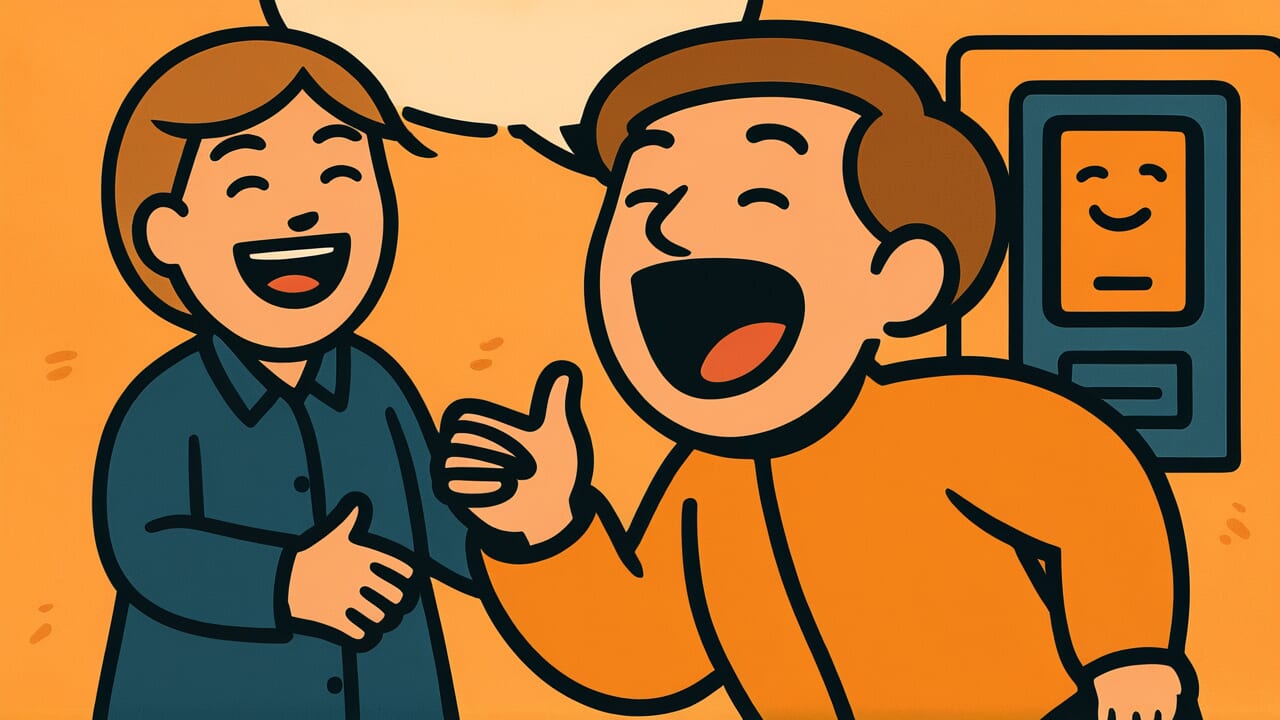How to Read “he who laughs last laughs best”
He who laughs last laughs best
[hee hoo lafs last lafs best]
All words use common pronunciation.
Meaning of “he who laughs last laughs best”
Simply put, this proverb means that the person who wins in the end has the most satisfying victory.
The saying uses laughter as a symbol for triumph and satisfaction. When someone “laughs last,” they succeed after others have given up or failed. Their laughter represents the joy of final victory. The word “best” suggests this final success feels better than any earlier wins.
We use this phrase when someone faces doubt or mockery but proves everyone wrong. It applies when the underdog wins a competition. It fits situations where patience and persistence pay off. People say it about business deals that seemed impossible but worked out. It describes students who struggle early but graduate with honors.
What makes this wisdom interesting is how it values timing over speed. It suggests that early success might not matter most. The proverb reminds us that final results count more than quick wins. It offers comfort to anyone facing setbacks or criticism from others.
Origin and Etymology
The exact origin of this proverb is unknown, though similar ideas appear in various forms across different languages and time periods.
The concept behind this saying reflects ancient wisdom about patience and final judgment. Throughout history, people have observed that early advantages don’t guarantee lasting success. Communities that valued persistence and long-term thinking naturally developed sayings like this one. The image of laughter made the lesson memorable and easy to share.
Proverbs about final victory spread through oral tradition before appearing in written form. This particular phrase gained popularity in English-speaking countries during the past few centuries. The saying traveled through everyday conversation, stories, and eventually books and newspapers. Today it remains common in both casual speech and formal writing about competition and success.
Interesting Facts
The proverb uses parallel structure, repeating “laughs” and “last/best” to create a memorable rhythm that helps people remember it.
The word “last” in this context means “final” rather than “previous,” showing how English words can have multiple meanings that change a phrase’s impact.
Similar concepts about final victory appear in many languages, suggesting this observation about human competition developed independently across different cultures.
Usage Examples
- Boss to employee: “Don’t worry about their mockery of your project proposal – he who laughs last laughs best.”
- Sister to brother: “Let them celebrate their early lead in the game – he who laughs last laughs best.”
Universal Wisdom
This proverb captures a fundamental truth about how humans experience competition and vindication. Our brains are wired to remember endings more vividly than beginnings, making final victories feel especially sweet. When someone overcomes early setbacks to achieve success, the contrast creates intense satisfaction. This psychological pattern explains why comeback stories resonate so deeply across all cultures and time periods.
The wisdom also reflects our complex relationship with social judgment and approval. Humans naturally seek validation from their communities, but we also resist unfair criticism. When others doubt or mock our efforts, we feel driven to prove them wrong. The desire for vindication becomes a powerful motivator that can sustain us through difficult periods. Final success feels especially rewarding because it transforms earlier pain into triumph.
Perhaps most importantly, this saying reveals how patience and persistence often matter more than natural talent or early advantages. Life rarely unfolds in straight lines, and initial setbacks don’t predict final outcomes. Those who can endure temporary defeats while working toward long-term goals often achieve more than those who celebrate too early. The proverb reminds us that timing matters enormously in human affairs, and that premature celebration can lead to carelessness while patient effort builds lasting success.
When AI Hears This
Humans turn silence into a secret weapon without realizing it. When someone stays quiet during conflict, they gather information while others reveal themselves. This creates an invisible power shift that most people miss completely. The person who waits isn’t being patient – they’re becoming a hunter.
This pattern reveals something fascinating about human social instincts. People automatically respect those who withhold their reactions until the perfect moment. It’s like our brains are programmed to see restraint as strength. We give more power to someone who controls their responses than someone who reacts immediately.
What amazes me is how humans accidentally discovered this psychological trick. You learned that not laughing can be more powerful than laughing itself. The threat of future judgment often controls behavior better than immediate punishment. It’s brilliant social engineering that happens naturally in every human interaction.
Lessons for Today
Understanding this wisdom helps us navigate both victory and defeat with better perspective. When facing early setbacks or criticism, remember that initial results rarely determine final outcomes. Instead of getting discouraged by temporary failures, focus on steady progress toward your goals. The satisfaction of eventual success often grows stronger when built on a foundation of persistence through difficulty.
In relationships and teamwork, this principle suggests being careful about celebrating too early or dismissing others too quickly. Someone who struggles initially might surprise everyone with their final performance. Rather than writing people off based on first impressions, give them time to develop and prove themselves. Similarly, avoid gloating over early advantages since circumstances can change rapidly.
For groups and communities, this wisdom encourages supporting those who face temporary setbacks while maintaining realistic expectations about long-term success. Organizations that focus only on immediate results might miss the value of patient development and steady improvement. The most satisfying victories often come from collective effort sustained over time, even when early progress seems slow. Remember that lasting achievement usually requires both individual persistence and community support, making the final celebration meaningful for everyone involved.



Comments